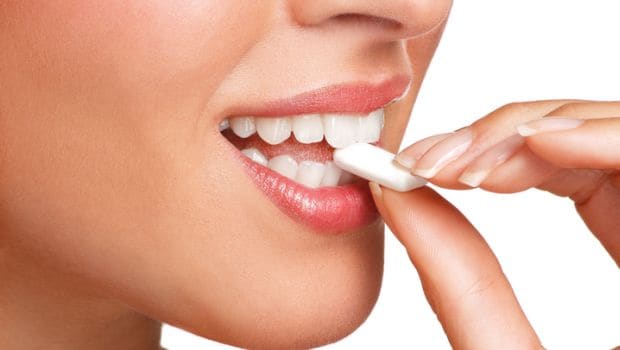Love chewing gum? How quickly and efficiently does it save you from an embarrassing encounter which can get absolutely ruined on account of bad breath! After all, some foods, not matter how tasty or delicious, do leave behind a foul smell, and you can’t carry your brush and floss with you at all times. Let’s not also not forget how a piece of gum can come to your rescue during most boring activities of the day. Available in various exciting flavours, these are cheap, easy to get and so yummy too. Chewing gum can help stimulate the flow of saliva in your mouth, and saliva in turn can protect your teeth and get the digest. Chewing gum 20 minutes after a meal is also known to help restore oral pH balance. However, these reasons must not be your excuse to constantly chew on a piece of gum. There are several cons associated to this seemingly harmless habit: Read on..
 Depression tastes like a tasteless chewing gum.1. Aching Jaws Continuous gum chewing can cause your jaws to ache, not only is your jaw working extra hard to chew the gum, but excessive chewing over a long period of time can also aggravate the wear and tear of the cartilage and surrounding joints.
Depression tastes like a tasteless chewing gum.1. Aching Jaws Continuous gum chewing can cause your jaws to ache, not only is your jaw working extra hard to chew the gum, but excessive chewing over a long period of time can also aggravate the wear and tear of the cartilage and surrounding joints.
2. Can lead to stomach ache and bloating Chewing gum allows excess amount of swallowed air to go down your food pipe and cause pressure in the abdominal area, causing stomach ache. The excess amount of air can also contribute to bloating. It can trigger gastro-intestinal problems too, as while chewing you are activating many enzymes and acids without actually having any food, which the body is preparing to digest. Those suffering from IBS are advised against chewing gum by experts.

3.May contain excess artificial sweetenersIf you are into chewing gum, make sure you are aware about the ingredients used. Some may be loaded with sugar to make flavours appeal, others could have artificial sweeteners which have been linked to several health consequences. Artificial sweeteners can also damage your tooth enamel and prove harmful for your gut health and metabolism in the long run.
 Colors speak all languages.4.Chewing gum can cause headaches
Colors speak all languages.4.Chewing gum can cause headaches
Yes there are many advertorials that claim that chewing gum can increase focus, but chewing gum continuously for a long span of time can cause headaches. This is because there are about eight muscles required to chew. According to experts, unnecessary chewing for a long period of time can cause chronic tightness on some of these muscles that connect your skull and jaw also called the temporomandibulate joint, or TMJ (the place where the jaw meets the skull). 5.Reduces your appetiteThis may work as both good or bad. The good part is that you would be able to curb your instinct to binge into fattening foods, but at the same time you would also be ignoring your fruits, veggies and nuts along the way.
5.Reduces your appetiteThis may work as both good or bad. The good part is that you would be able to curb your instinct to binge into fattening foods, but at the same time you would also be ignoring your fruits, veggies and nuts along the way.
 Blowing gum is more interesting than chewing gum.
Blowing gum is more interesting than chewing gum.
What instead of chewing gums?
Peeled and dried licorice roots when chewed can treat a host of stomach conditions like acid reflux, peptic ulcers and gas. You can also chew some elaichi or parsley leaves (cardamom) for a fresh smelling breath.

2. Can lead to stomach ache and bloating Chewing gum allows excess amount of swallowed air to go down your food pipe and cause pressure in the abdominal area, causing stomach ache. The excess amount of air can also contribute to bloating. It can trigger gastro-intestinal problems too, as while chewing you are activating many enzymes and acids without actually having any food, which the body is preparing to digest. Those suffering from IBS are advised against chewing gum by experts.

3.May contain excess artificial sweetenersIf you are into chewing gum, make sure you are aware about the ingredients used. Some may be loaded with sugar to make flavours appeal, others could have artificial sweeteners which have been linked to several health consequences. Artificial sweeteners can also damage your tooth enamel and prove harmful for your gut health and metabolism in the long run.

Yes there are many advertorials that claim that chewing gum can increase focus, but chewing gum continuously for a long span of time can cause headaches. This is because there are about eight muscles required to chew. According to experts, unnecessary chewing for a long period of time can cause chronic tightness on some of these muscles that connect your skull and jaw also called the temporomandibulate joint, or TMJ (the place where the jaw meets the skull).


What instead of chewing gums?
Peeled and dried licorice roots when chewed can treat a host of stomach conditions like acid reflux, peptic ulcers and gas. You can also chew some elaichi or parsley leaves (cardamom) for a fresh smelling breath.
Advertisement
About Sushmita SenguptaSharing a strong penchant for food, Sushmita loves all things good, cheesy and greasy. Her other favourite pastime activities other than discussing food includes, reading, watching movies and binge-watching TV shows.







